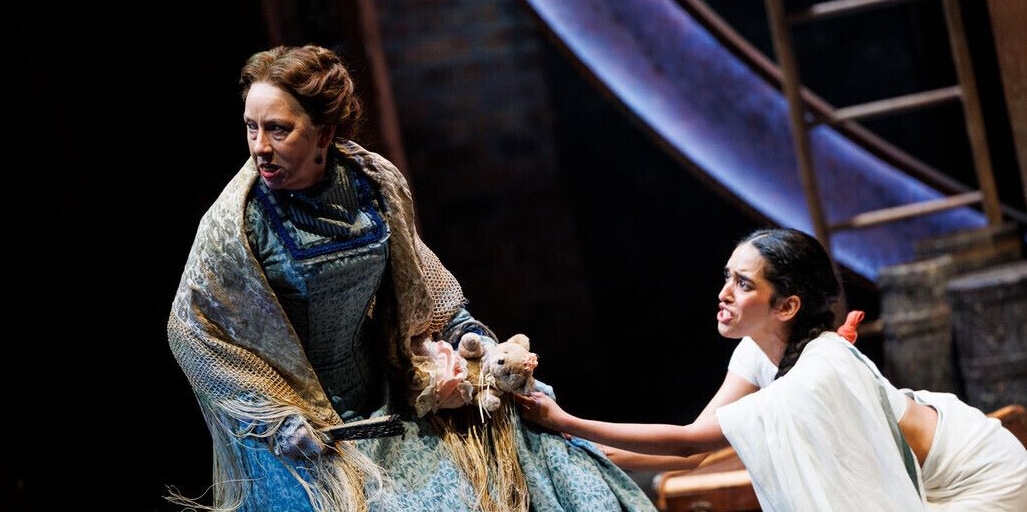I am happy to say that the new production of The Empress by Tanika Gupta at the RSC is excellent. The acting throughout by everyone in the cast is impressive and the staging is, in every way, attractive and stimulating.
I have to confess that I had a bit of trouble during the first act because I found the story of the Indians arriving in London during he latter years of the reign of Queen Victoria uncomfortable. Was it a bit too predictable, a bit “virtue signalling”? Of course our heroine, Rani, is going to be abandoned to her own fate by her calculating, cold British family who no longer need her once they get back to the Mother Land; of course she cannot really trust the young man, Hari, who helps her find a bed for the night in a place she finds unsavoury; of course when she finally gets a job as an ayah the toff is going to fall for her, seduce her and then refuse to acknowledge her child is his. Of course she is only sixteen years old at the start of the story. And, of course, I found myself thinking about young people arriving in this country now as refugees or migrants, disoriented, hoping for kindness and mostly disappointed.
It was somehow inevitable too that Rani is also going to fall among people who have been equally abused by white Brits and they will ultimately become her support system. During the first half of the show I found the developing other strand, the relationship of Queen Victoria to an Indian gentleman sent to her as a servant and her delight in learning about things to do with India and in Abdul Karim himself more convincing and interesting. I was also more thoughtfully engaged by the glaring prejudice and shallowness of the Queen’s Lady in Waiting, Lady Sarah, and all that she represented of the culture of the court. Of course, I had seen the movie about the same relationship and the hostility of the courtiers with Judi Dench.
But I also found myself interested in both worlds of the play by the interval and came out of the theatre wondering how things would progress. Would the courtiers grow up, learn tolerance, be influenced by their queen’s attitudes? Would Rani abandon her baby? I also spent the interval wondering if I was being unfair to this play because I had come into the theatre informed by having read William Dalrymple’s excellent book about the East India Company, The Anarchy, which I recommend highly.
The second half of the evening goes in a different direction. Rani keeps the baby, develops a community of friends and becomes an assistant to Dadabhai Naoroji, an historical figure who was the first ever Indian Member of Parliament in the UK. Somehow the linking of Rani to real historical events stops this woman from seeming merely emblematic and makes her a convincing character. Her relationships with her circle of supporters and others also somehow makes them all more believable. I don’t want to give away the ending but it includes some serious redemption, some magical music and dancing and is fully and deeply satisfying.
I must praise fulsomely that entire cast. Tanya Katyal is glowing and memorable in her portrayal of Rani Das and, along with the sympathetic and intellectually curious Queen Victoria played by Alexandra Galbreath, anchors the play. Both actresses are delightful in their roles, moving when necessary and humorous as well, particularly the curmudgeonly and frank Galbreath. I very much enjoyed and was moved by Aaron Gill as the love struck Hari who is made into a better, more ambitious and loving man by his feeling for Rani and his frustrating adventures. Raj Bajaj is subtle, changeable, complex and brilliantly attractive as Abdul Karim and Simon Rivers gives a strong performance as
Dadabhai Naoroji, making me want to find out more about the history of this man and his contribution to the politics of his era. The cast works together as a striking ensemble and Nicola Stephenson and Miriam Grace Edwards stand out as Lascar Sally and Polly.
By the end of the evening I felt completely involved in the tale and felt I had grown to know the characters and their situations properly. This is certainly due to the strong direction of Pooja Ghai. Rose Maggiaora has designed an attractive production that is wonderfully flexible and serves the text well, evoking the scenes and events of the era through sets and costumes. Special mention must be made too of the musicians. I came out thinking that this was fine, enjoyable, stimulating theatre and also that this text is probably even more relevant today than when it was first performed.
I commend the RSC for bringing this play back to The Swan, where it originated, in collaboration with Pooja Ghai, the Artistic Director of Tamasha Theatre Company.

